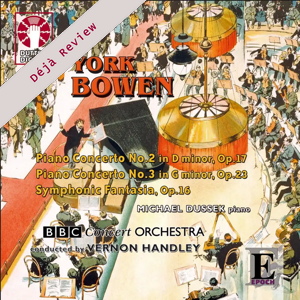
Déjà Review: this review was first published in August 2007 and the recording is still available.
York Bowen (1884-1961)
Piano Concerto No. 2 in D minor ‘Concertstück’, Op. 17 (1905)
Piano Concerto No. 3 in G minor ‘Fantasia’, Op. 23 (1907)
Symphonic Fantasia, Op. 16 (1905)
Michael Dussek (piano), BBC Concert Orchestra/Vernon Handley
rec. 2007, The Colosseum, Town Hall, Watford, UK
Dutton Epoch CDLX7187 [75]
Compact discs of Bowen’s music tumble onto the market in quick succession and many of them – chamber and orchestral – are from Dutton a firm that regularly punches above its weight. No doubt we shall be hearing Bowen’s Rachmaninov-indebted Fourth Piano Concerto from Dussek and Dutton before too long. Chandos have already recorded the first two symphonies for issue next year and the same company also offer two impressive CDs of his piano music from Joop Celis. In the meantime here are three substantial works to explore – two compact three movement piano concertos and a big multipartite tone poem. Dutton’s recording of the Piano Concerto No. 1 and the Violin Concerto (CDLX7169) should not be forgotten.
The Second Piano Concerto is grandiloquent from the outset and the Colosseum provides an awesomely chasmal acoustic yet not such as to cloud the detail. Bowen writes in a saturated grand romantic style which echoes with references from Tchaikovsky, Grieg and Rachmaninov. He was very much a child of the Frederick Corder DNA strand at the RAM rather than the more buttoned up Stanford/Parry RCM blood-line. There’s a dreamy lento with a solo viola duetting with the piano but Bowen cannot resist the heart-on-sleeve Russian-style climax for long and so it comes at 2:20 before the music winds down to the more intimate communion of the movement’s opening. The lento is surprisingly short – I suspect Bowen wanted to get back to the triumph and the thunder. The finale is playful and flighty in the manner of the Scriabin Piano Concerto, Tchaikovsky 2 and Rachmaninov 1. It’s deeply enjoyable.
The Third Piano Concerto follows a similar schema and style although this time I was reminded of the very fine Arensky Piano Concerto. Certainly Mr Dussek is kept glitteringly busy in a broadly and sometimes specifically (I 5:20) Tchaikovskian idiom. There’s a rather lovely sentimental melody in the – once again – short andante grazioso middle movement. Bowen, true to form, cannot resist the magnetic pull of a major climax in the middle of the movement. Once again the Russophile in Bowen is on full view in the finale Allegro con fuoco. However as with the finale of the Second Concerto there is some byplay, this time in an almost pretty Oriental style. At this point I was fleetingly reminded of Cyril Scott’s First Piano Concerto of 1915. Some skipping figures towards the end recall Bax however more often than not it is clear that Bowen has his star hitched to the Rachmaninov concertos. This is all very memorable and this is music I shall be returning to.
There are moments when the concertos tend towards the decorative and fragrant rather like the Saint-Saëns works. The Symphonic Fantasia is mellifluous darkly and swirlingly coloured with some fine episodes for solo instruments (violin, oboe, viola) along the way. It begin mystically and with some well built tension in an echo of Mahler’s First Symphony. Other composers are echoed or predicted including Miaskovsky (tr. 8 1:42), Richard Strauss and Elgar from In the South. While there are many entrancing episodes the structure lacks a sense of coherence. However while you are engaged by the delicately running violin figures running from channel to channel (tr. 8), the harp figure recalling Sibelius 1 (tr. 8), the sweetly singing solo violin and solo oboe (tr. 10) issues of structure seem hardly to matter. Other moments recall Bantock’s wispy impressionism in the overture Pierrot of the Minute. Performance and music meet in breathless beauty in tr. 11 where over a harp pulse, the gleam of silky-silvery violins fades from a dark rumble into a luminous chord before the gleam returns only to be stilled by a gentle drum-stroke. If one were trying to place this work one might compare it with Tchaikovsky’s tone poems in which case it would be Hamlet rather than Francesca.
The notes are by eminence brillante, Lewis Foreman who is seeing his wishlist of rare but fine British music being eroded at a rate of knots.
A most enjoyable helping of Bowen’s late-romanticism which does nothing to dampen the demand for more of the concertos.
Rob Barnett
Buying this recording via the link below generates revenue for MWI, which helps the site remain free.


















